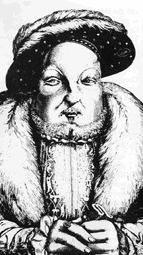Tudor England effectively absorbed Wales into it – and Wales had no choice but to join England.
Edward I had conquered Wales by 1283. The most rebellious part of Wales was Snowdonia and Edward built a number of large and formidable concentric castles around Snowdonia that were meant to terrorise the people of North Wales into submission.
After 1283, the land of Wales that was under the control of the King was called “The Principality”. This area, about a third of Wales, was ruled as if it was part of England. As in England, the Principality was divided into shires which were governed by men appointed by the king. The more important towns in the principality were Aberystwyth, Harlech, Caernarvon and Conway. Two-thirds of Wales was still governed by what were called the “Marcher Lords”. This was land that had been conquered by the Norman’s during the 11th and 12th centuries.
In 1485, Henry Tudor defeated Richard III at the Battle of Bosworth. Henry was a Welshman and the involvement of Welsh soldiers at Bosworth played a significant part in Henry’s victory. After he became king, Henry rewarded many Welsh men with government posts in London.
In 1509, Henry VIII succeeded his father to the throne. Henry did not have the same feel for Wales that his father had. Henry VII had a Welsh dragon and a wolfhound on his heraldic insignia. Henry VIII dropped the wolfhound and replaced it with a lion, thus making the royal insignia less Welsh.

Henry VIII |
Henry VIII was concerned by the way the Marcher Lords governed their lands. Henry became convinced that they were not stamping down on criminals who operated seemingly at will along the Welsh and English border. It was also a simple fact that criminals were committing offences in England, near the Welsh border, and then crossing over to Wales thus all but escaping justice. It was reported that one Marcher lord received payment from twenty-three murderers and twenty-five robbers in return for being protected from English justice.
Henry’s concerns over Wales heightened after his clash with the Roman Catholic Church after his divorce from Catherine of Aragon. Many Marcher lords were Roman Catholic and Henry was not confident that they would prove loyal after his clash with the pope. He was also concerned that parts of Wales – especially the south-west corner – were open to landings from either French or Spanish forces. The coast of Wales was poorly defended. Because Henry could not guarantee the loyalty of the Marcher lands, he decided to take full control of Wales and remove the power of the Marcher lords.
Between 1536 and 1543, a compliant English Parliament passed a series of laws that together became known as the Acts of Union. Wales became a united entity and the Principality lands and the Marcher lands both disappeared. The whole of Wales was divided into shires (counties) and each one had a Justice of the Peace – appointed in England.
Under the terms of the Acts of Union, Wales was represented in Parliament but there was an attempt to remove a national identity from Wales. Welsh MP’s were not truly representative of the people in their constituencies and Welsh was not spoken in Parliament. The rich Welsh families who sent their sons to London in an effort to advance themselves, ensured that they only spoke English. The law courts in Wales only conducted their affairs in English. By doing this, Henry was attempting to ‘make’ all Welsh people English and thus tie them to London in terms of loyalty. If you wanted to make your way in London either politically or socially, as a young Welshman you had to drop any pretence of being Welsh.
How did the Welsh react to this? The evidence seems to suggest that they took it as a fait accompli. With such a massively powerful neighbour, what else could they do? The example of what Edward I did to Wales was still something the Welsh could not forget and the symbols of English dominance were very plain to see. Also, English control of Wales meant that the border area was no longer the dangerous zone that it had been – which benefited the Welsh as well as the English . The union also allowed Wales to join in the prosperity that England seemed to be going through under Henry’s sovereignty. However, which ever way it was looked at, what Henry did was crude and done in such a way that the Welsh could not openly complain even if they wanted to.